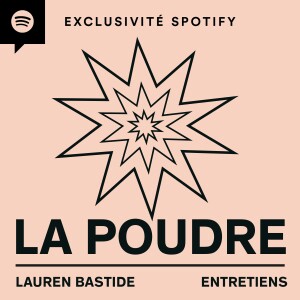
Cet épisode de La Poudre est disponible à l’écoute dans une version doublée en français. Cliquez sur l'épisode suivant pour l’écouter.
Part of the discussion in this episode revolves around sexual violence. It may be triggering for survivors.
--
The radiant author and artist Chanel Miller is the guest of the 106th episode of La Poudre, the 6th episode of its mini-series “Me Too and Now?”.
“Me Too and Now?” is an eight-episode series to give the floor to sexual violence whistleblowers who have made and are still making the #MeToo revolution. Whether they have taken the mic, the keyboard or the pen, whether their testimonies have had judicial repercussions or not, they have put words on what is often silenced, they have said “me too”. But what comes next? What does one feel after speaking up? Do they feel stronger? More vulnerable? Do they feel heard, understood by society, by the justice system, by the media? By their closed ones? Is speaking up healing, or do they just get by?
Episode Summary:
Chanel Miller’s identity was revealed to the world when her first book came out: Know my name (07:09). In it, she was speaking up in her own name for the first time, to tell her story: the one of a young woman who was the victim of a rape, and of her agressor’s trial. She had stayed anonymous during the procedures, and has since reclaimed her own story as well as being called a victim. Even though she will not be reduced to it, she appreciated the power and importance of this label when her aggressor tried to define himself as such during the trial (14:08). This trial – probably one the most important in the United States judicial history on violence against women –, has taken place soon before the beginning of the #MeToo movement and has presumably helped build its momentum. Chanel Miller observed these flowing testimonies with awe and gratitude, intimately knowing the risks of speaking up publicly against sexual violence (16:37). She regrets that both institutions and society at large are not trying to actively protect survivors (19:41) to make sure they can safely deliver their story without having to prepare and arm themselves before doing so (25:41). She experienced first-hand the brutality of not only the justice system, but also of the media (30:17) and social networks (34:04). She had to learn to keep it at arm’s length and harness her own anger to be able to express her point of view (37:16). She did it admirably at the end of the trial with her victim impact statement which was then published in its entirety (41:17), and then just as brilliantly in her book. She now hopes to be able to keep on writing and spread the love and encouragement she received to other survivors, so they may feel supported along their way (55:54).
Producer: Lauren Bastide
Exclusively broadcasted on Spotify
Opening title: Lauren Bastide and Marion Emerit on an original concept by Aurore Meyer-Mahieu
Original music for the introduction: Jeanne Cherhal
Editing, mixing: Marion Emerit
Executive production: Gaïa Marty with the help of Marie Vincent
Learn more about your ad choices. Visit podcastchoices.com/adchoices
More Episodes
 2018-01-25
2018-01-25
 2018-01-11
2018-01-11
 2017-12-28
2017-12-28
 2017-12-21
2017-12-21
 2017-12-14
2017-12-14
 2017-11-30
2017-11-30
 2017-11-16
2017-11-16
 2017-11-09
2017-11-09
 2017-10-19
2017-10-19
 2017-10-05
2017-10-05
 2017-07-27
2017-07-27
 2017-07-13
2017-07-13
 2017-06-29
2017-06-29
 2017-06-01
2017-06-01
 2017-05-18
2017-05-18
 2017-05-04
2017-05-04
 2017-04-20
2017-04-20
 2017-04-13
2017-04-13
 2017-04-06
2017-04-06
Create your
podcast in
minutes
- Full-featured podcast site
- Unlimited storage and bandwidth
- Comprehensive podcast stats
- Distribute to Apple Podcasts, Spotify, and more
- Make money with your podcast
It is Free
- Privacy Policy
- Cookie Policy
- Terms of Use
- Consent Preferences
- Copyright © 2015-2024 Podbean.com






